Classics revisited: Vanya on Yonge St, Macbeth with puppets, a twisty Don Giovanni and lots more
Long overdue reviews of winter shows, including Uncle Vanya, MacBeth: A Tale Told by an Idiot, Dion, As I Must Live It and more
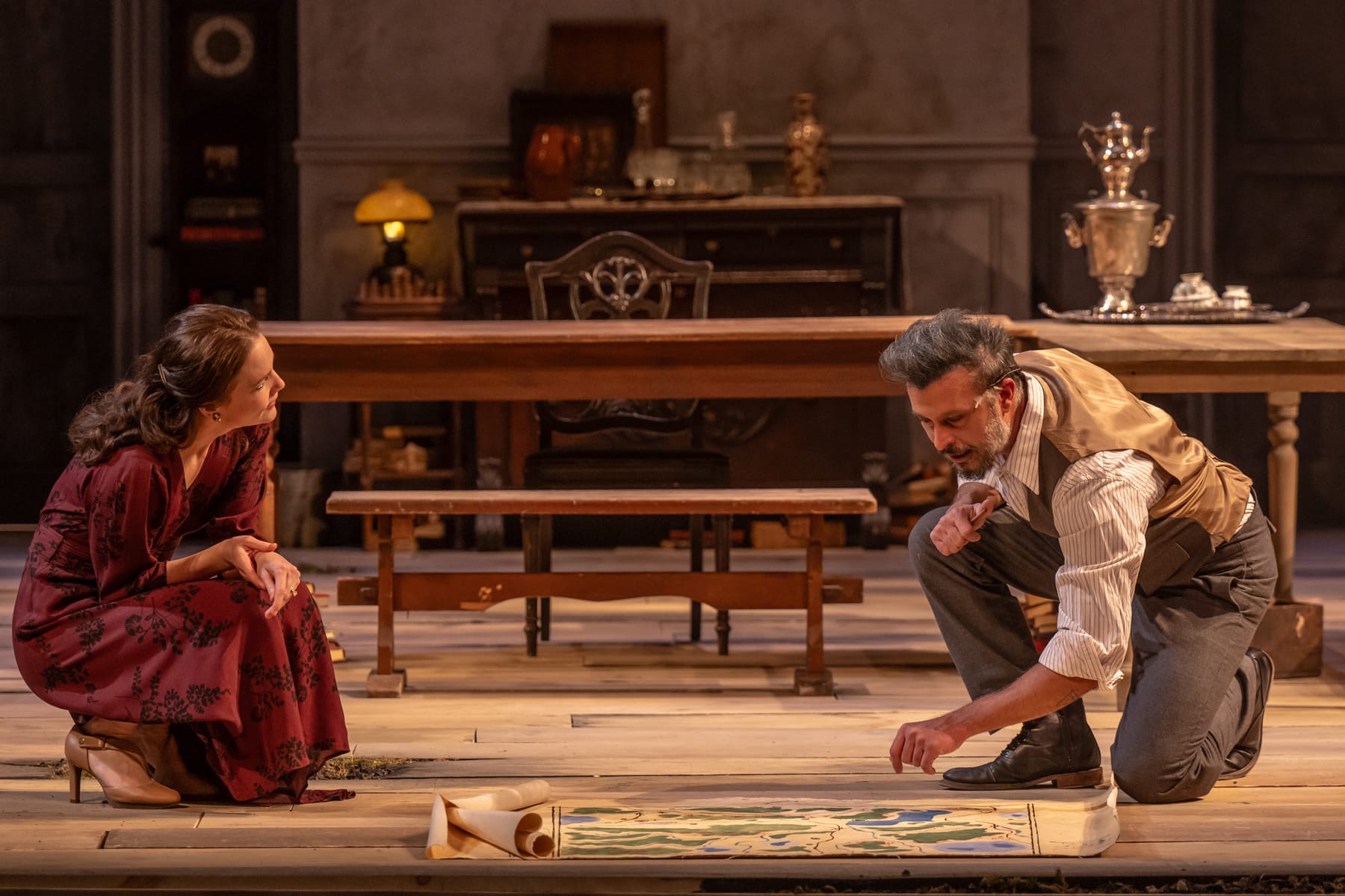
This post is sponsored by CBC podcast PlayME. The podcast's version of Trey Anthony's classic 'Da Kink in My Hair is now available for streaming, and co-host/producer Chris Tolley's interview with Anthony is now up as well.
Even though the popular play is over two decades old, I never knew until listening to the interview that Anthony hadn't originally set her play in a hair salon. Anthony also spills the tea on the subsequent TV series, and how she had to be convinced to borrow $700 to enter the Toronto Fringe, where the first version of the play debuted in 2001.
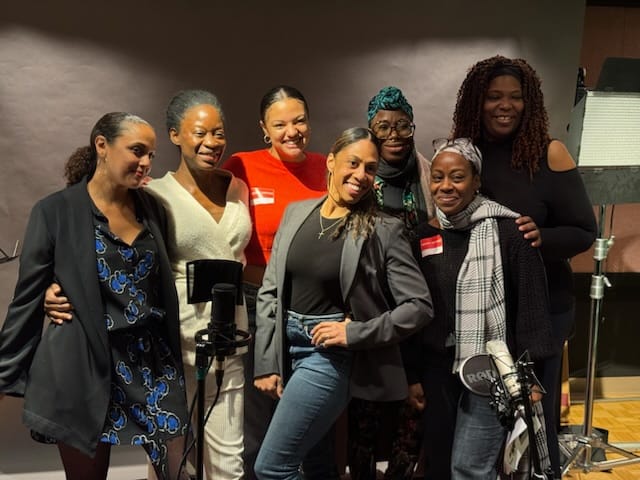
The same cast that appeared in the 20th anniversary Soulpepper/TO Live staging at the Bluma Appel reassembled for this recording, with standout performances by Satori Shakoor, d'bi young anitafrika, Olunike Adeliyi and Ordena Stephens-Thompson as the warm salon owner Novelette, who can tell things about the women's lives by working on their hair.
You can listen to the interview with Anthony here, with links to the two parts of the show and an archive of podcast's other works, including Uncle Vanya, at the same site.
Vanya, revisited
Even if you saw Chris Abraham's award-winning production of Chekhov's Uncle Vanya (Rating: ✭✭✭✭✭) at Crow's Theatre in the fall of 2022, you'll want to revisit it at the CAA Theatre on Yonge St. I was skeptical that it would work in a traditional staging at a much bigger house – it was presented in the round at Crow's – but what it loses in intimacy it more than gains in clarity and precision.
One of the joys of the earlier Crow's staging was how open and airy the exquisite design made the play feel. I especially loved how Kimberly Purtell's lighting design shone through the big, oversized garden windows of Joshua Quinlan's rambling, bric-a-brac-filled set. Entrances and exits from the four corners of the playing area gave you a good sense of the geography and decayed grandeur of this estate.
The airiness might be gone, but that windowed garden exit still exists, and there are other atmospheric touches, like a bucket to collect the dripping water from the ceiling (nicely captured in Thomas Ryder Payne's sound design).
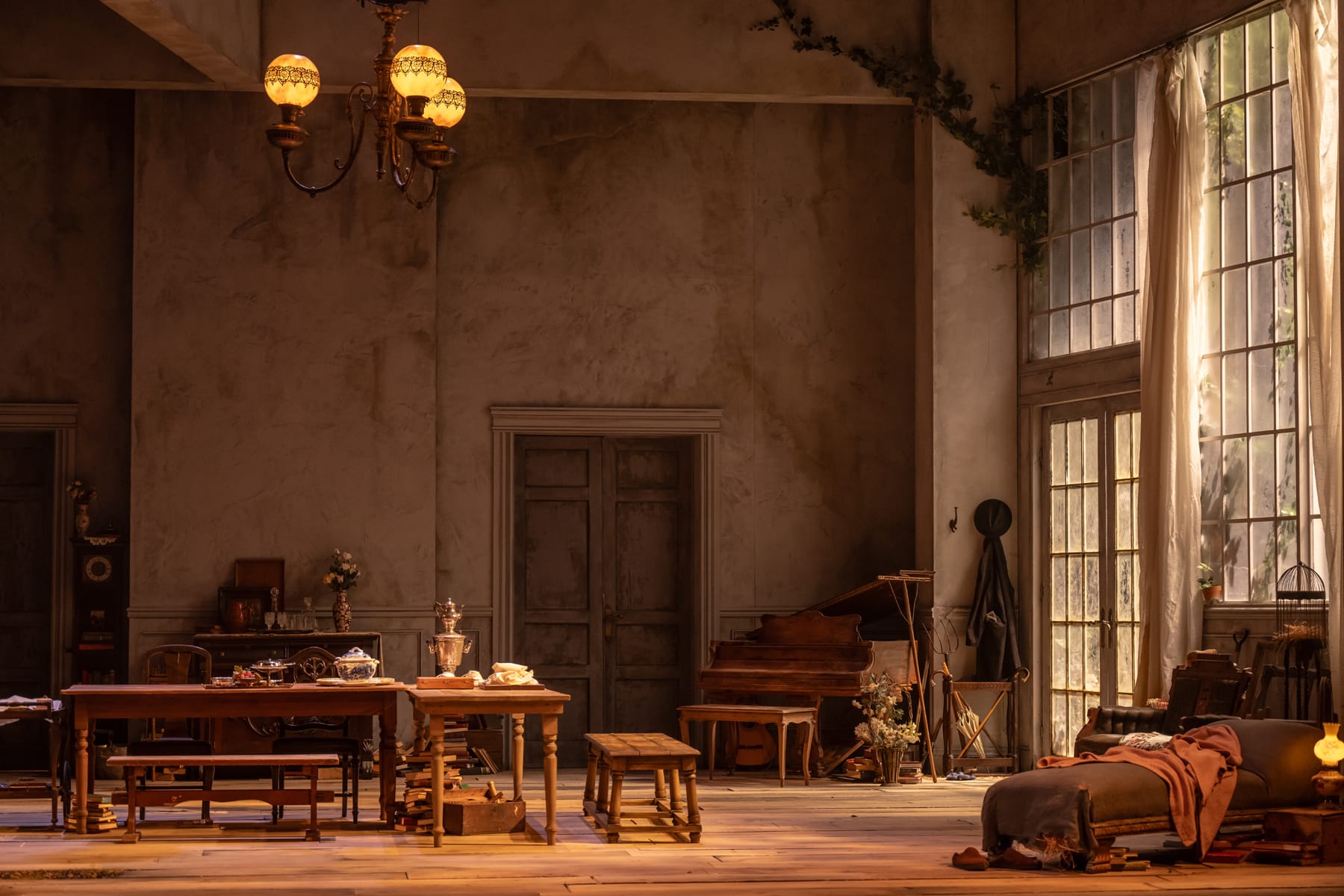
Also, what a difference a nice, big, solid, wall stained with age can make in establishing the play's setting. As if to announce the change, when the titular Vanya (Tom Rooney) makes his first appearance, he can't open a stuck door and so he kicks it down – giving us an immediate feel for the home's delapidated state but also showing us this man's pent-up frustration and anger with his disappointing world.
I'm focusing so much on the design because Abraham and his team have obviously thought through the challenge of how to transfer the play to another space. (Incidentally, Abraham's vision of another, more glamorous Russian story is currently on at Crow's, where it's been extended yet again until March 17.)
It's all the perfect backdrop for Chekhov's bittersweet story of thwarted ambitions, unreciprocated love and human endurance, sensitively adapted by Liisa Repo-Martell. (For a revealing look at Repo-Martell's adaptation, check out CBC podcast PlayMe's interview with her here.)
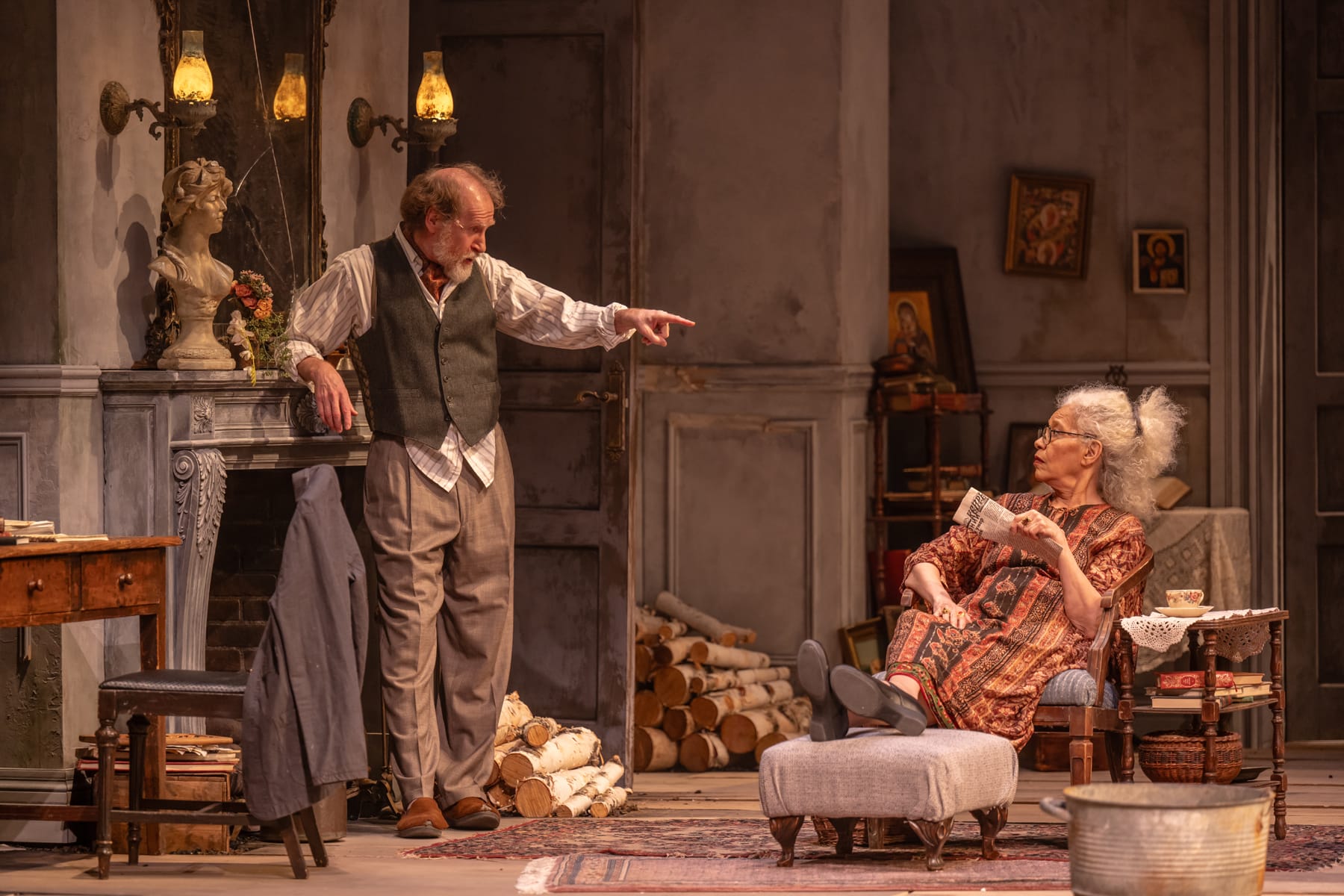
The performances have all deepened in a year-and-a-half. Rooney has, of course, played any number of rambling, talkative characters, often in love, but his outbursts here feel especially painful. At times he trips over his words because Vanya's mouth can't keep up with his roiling jumble of thoughts and emotions. His proffers of love to his brother-in-law's young wife, Yelena (Shannon Taylor), are pathetic and sad because he's so filled with self-pity and loathing.
His partner in misery is Sonya (bahia watson). Together they have dedicated their lives to running the estate – unappreciated, unthanked. Watson's Sonya takes a parallel journey of hope and despair, but her approach is a little different; she doesn't lash out in sarcasm like her uncle but becomes giddy with expectation until she has her dreams of romantic fulfillment dashed. The actor's youthful spirit and energy feel snuffed out in the final moments (her more sober second act costume by Ming Wong also helps emphasize this).
Taylor's Yelena and Ali Kazmi's ecologically-minded country doctor, Astrov, are the figures of adoration who find themselves drawn to each other. Their connection is palpable, especially in a wonderful scene – brimming with unspoken longings – in which Astrov shows the young woman how the Russian forest has been affected by progress over the years.
The way Abraham stages this scene – Astrov's maps are laid out on the floor, rather than a table, downstage – draws you into their developing relationship. At other times in the play, the touch of a hand on a shoulder, or a quick, intense conversation in a remote upstage corner of the room, or the way a character lounges wearily on a sofa, tells you so much about the dynamics in this family.
"Maybe people 200 or 300 years from now will have figured out how to be happy," says one wistful character near the end of the play. The line got a laugh at the performance I attended. Of course we haven't. But there are lovely consolations from getting to savour such haunting, spine-tingling truths in art.
Uncle Vanya continues at the CAA Theatre (651 Yonge) until February 25. See info here.
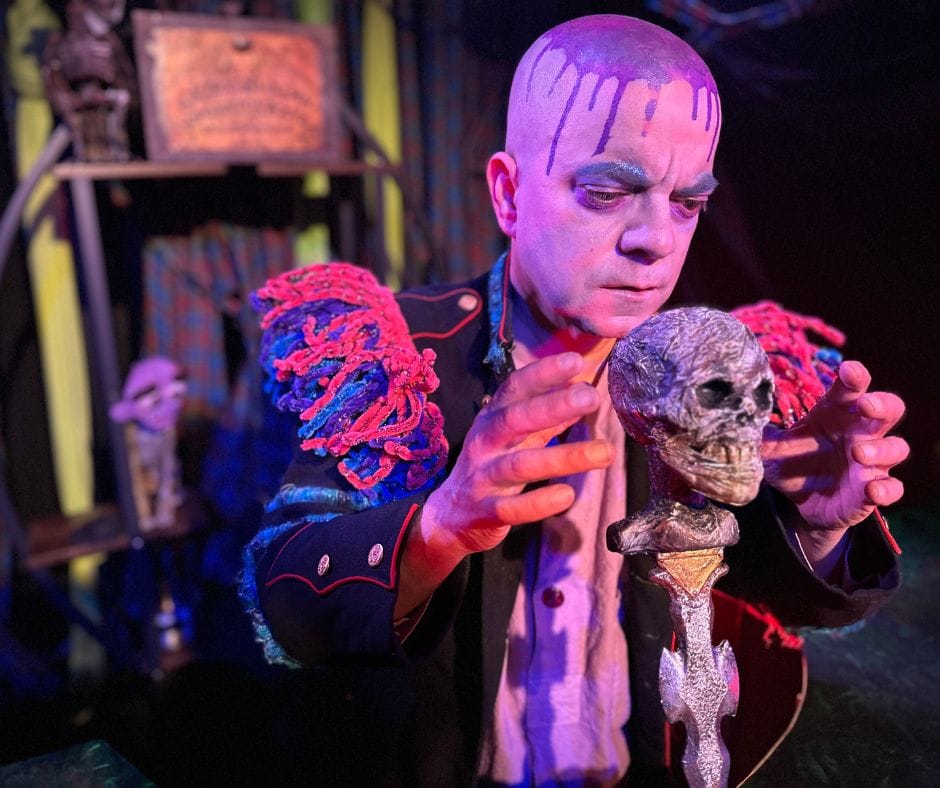
Mesmerizing Macbeth
Shakespeare's Scottish play gets a Weird Tales meets Looney Toons treatment in MacBeth: A Tale Told by an Idiot (Rating: ✭✭✭✭✭). Eric Woolfe's mesmerizing Eldritch Theatre Company adaptation takes his unique artistry to a whole new, bloody good level.
Woolfe has performed Shakespeare before – he was in Canadian Stage's As You Like It a couple of years ago in High Park – but he would probably never be cast as the eponymous Scots warrior in a traditional production. Never mind. He gets to play him, as well as Banquo, Macduff, Lady M, the three witches, Duncan et al. in this marvellous staging by director Dylan Trowbridge.
Many of Woolfe's earlier productions have either explored subgenres or taken arcane and cultish works and adapted them for his particular brand of creepy-funny theatre involving puppets, magic and bizarre transformations.
What's so brilliant about his MacBeth is how the play's elements of mystery and the uncanny lend themselves so well to his techniques and obsessions. Here, the three witches or weird sisters are represented by three ghastly puppets, their heads placed one atop the other, their voices cackling in different pitches by Woolfe.
The eerily visaged Lady Macbeth, clad in a black cloak, sits atop Woolfe's hidden head so he can still extend his arms and display her blood-soaked hands, which of course will come to haunt her later.
Melanie McNeill's costumes are particularly effective. The crown, which transfers from Duncan to Macbeth, seems like such a cartoonish bit of yellow felt that it adds an absurd touch to the tragedy. It's clown-like, but only up to a point; the top of Woolfe's bald head is painted with a purple-stained mark, so that when he wears it blood appears to be seeping from it. Even the ornamental red epaulets on Macbeth's shoulders resemble viscera.
In past shows, Woolfe's coin and card tricks have sometimes taken us out of a scene to give us a break from the tension. Here, these bits are fully integrated into the show to underscore the play's themes of chance and fate. The way Woolfe and Trowbridge fuse a coin trick with a tradition for the dead – all while reciting one of the play's most famous passages – near the end is haunting.
Woolfe speaks the language with ease, giving each character a unique voice and cadence. What's more, Woolfe's 90-minute, intermissionless version of the play moves along with the speed and inevitability of Birnam Wood coming to Dunsinane.
The run sold out early on, and the company added another week. Let's hope it returns or transfers to another place. Imagine it at Stratford (who are gently parodied at one point)! And maybe Eldritch will consider some more plays with macabre elements – Titus Andronicus, anyone?
MacBeth: A Tale Told by an Idiot continues at the Red Sandcastle Theatre (922 Queen East) until February 24. See info here.
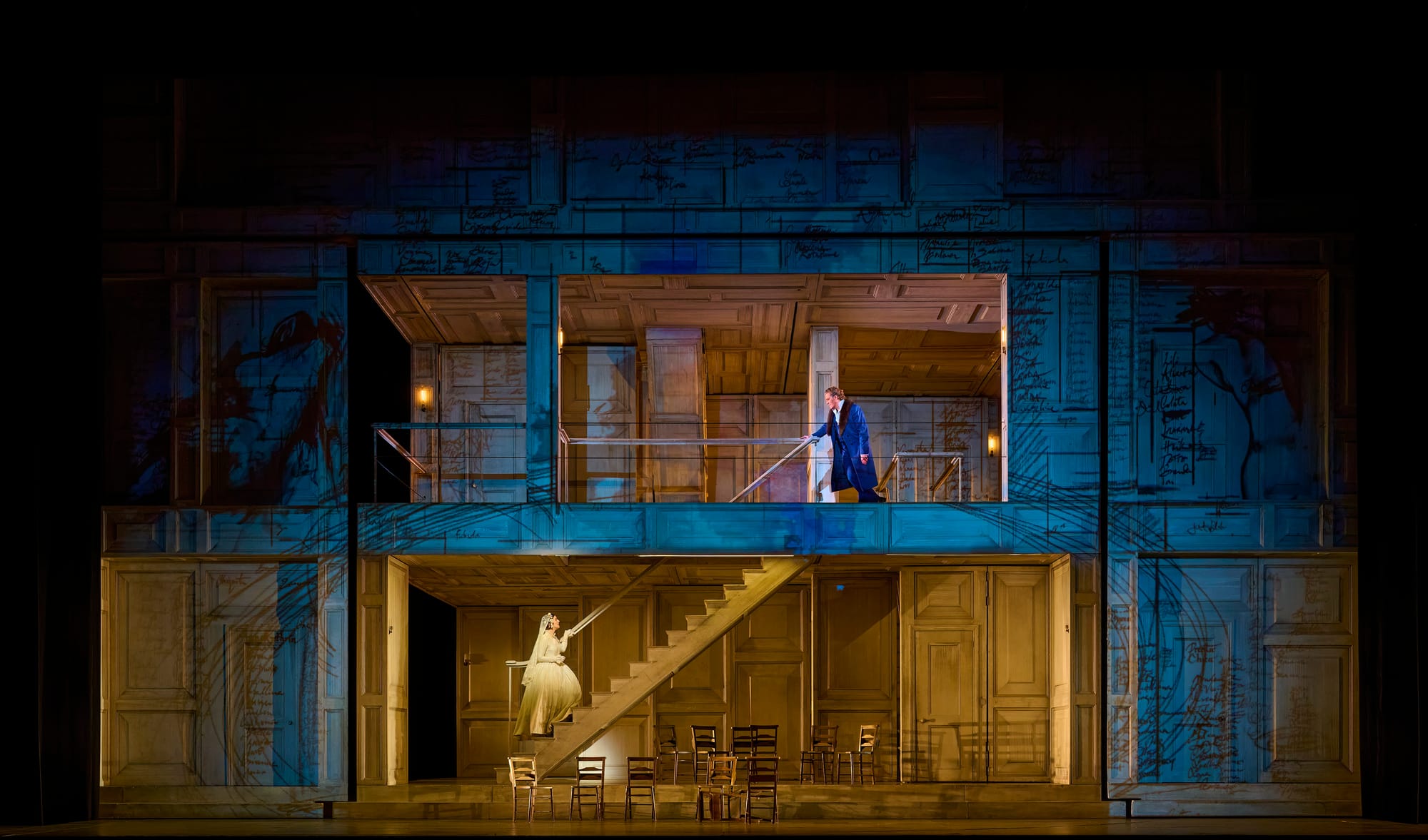
A sketchy Don Giovanni
Mozart's Don Giovanni (Rating: ✭✭✭) is such a magnificent work that it can easily withstand various interpretations. Even if the directorial approach eventually becomes tedious, as is the case with the Canadian Opera Company's current production, the glorious music and timeless themes still peek through.
Director Kaspar Holten's production initially seems promising, using a rotating, two-storey cube-like structure (designed by Es Devlin) and projections by Luke Halls to create a surreal setting, a commentary on the opera and (perhaps) a twisting, shifting psychological representation of the Don's (Gordon Bintner) immoral journey.
Sometimes the design enhances a scene – during the overture, we see a preview of a list of the title character's international conquests, the subject of which will later be sung about by the servant Leporello (Paolo Bordogna delivers a great interpretation). And during the title character's famous Champagne aria, for instance, he's seen in the eye of a dizzying, nightmarish storm.
But the black, white and grey tones of the set and projections soon grow repetitive. At times, the busyness of the projections detracts from the opera itself – it appears like the stage is being overtaken by an over-eager drafter or sketcher. And Holten's failure to effectively tell the opera's basic narrative soon becomes problematic. (An early casualty is Mané Galoyan's Donna Anna, who's seen in the opening scene in post-coital bliss after an encounter with the Don, which contradicts much of her later behaviour.)
In fact, it's unclear whether or not Devlin's architectural offering is meant to be a real set or merely an Escher like abstraction illustrating the main character's entrapment. If the latter, why do two key characters near the end emerge like zombies? Is it because they got too close to the Don and, in so doing, have bits of their own humanity and soul snuffed out?
Who knows? I'm glad I saw this production, which has been staged several times at the Royal Opera House Covent Garden since its debut in 2014. And under Johannes Debus's sometimes leisurely tempi, singers Bintner, Bordogna, Galoyan, Anita Hartig (Charlotte Siegel replaces her as Donna Elvira for the final performance), Ben Bliss (the model of a Mozart tenor), Simone McIntosh, Joel Allison and David Leigh all navigate this difficult production gracefully.
Don Giovanni continues at the Four Seasons Centre for the Performing Arts (145 Queen West) until February 24. See info here.
Reviews, in brief
Because there have been so many openings this winter, I'm posting capsule reviews of them below.
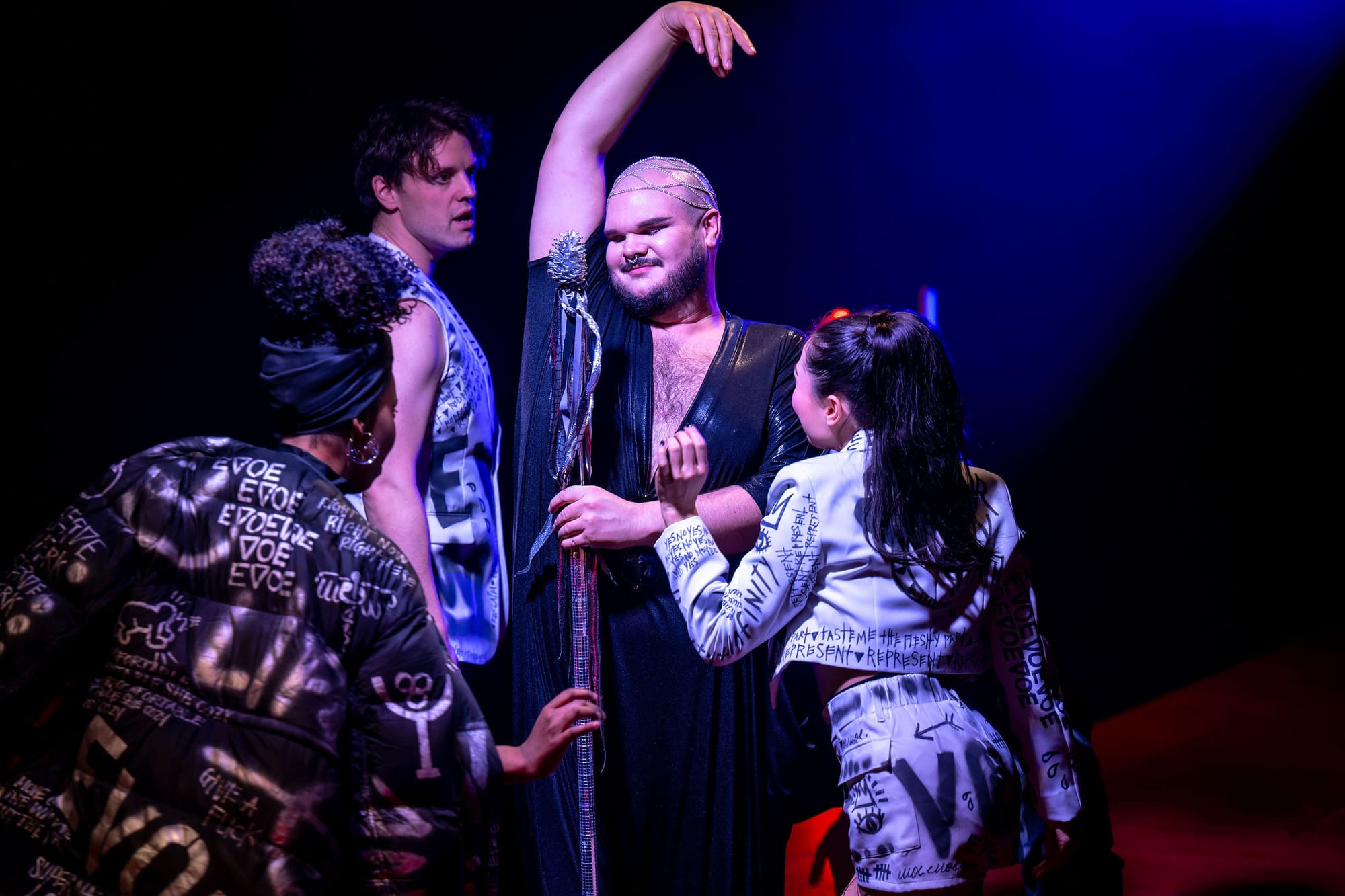
Dion: A Rock Opera
There's lots of talent both behind the scenes and onstage in Coal Mine Theatre's first world premiere production, Dion: A Rock Opera (Rating: ✭✭✭), based on the Greek classic The Bacchae. Ted Dykstra's music, played by a strong three-piece band, has a funky, seductive groove, and the cast – headed by Jacob MacInnis (who's surely a star in the making), Allan Louis, Carly Street, SATE and Allister MacDonald – is mostly good, although I wish their characters and motivations were clearer. Steven Mayoff's libretto often seems vague and tenuous, and some of the narrative threads become frayed. It all looks good, however, in Peter Hinton-Davis's striking production, especially with Scott Penner's glamorous costumes and set and Bonnie Beecher's lighting, which is responsible for one effect near the end that's especially startling. At 70 minutes, this feels like a workshop production that could be clarified and expanded into a two-act piece. Runs to March 3 at the Coal Mine Theatre (2076 Danforth). See info here.
On the Other Side of the Sea
A lonely bureaucrat and a hopeful fisherman meet on an abandoned pier at a beach in an unnamed country in On the Other Side of the Sea (Rating: ✭✭✭✭), Salvadoran playwright Jorgelina Cerritos's exploration of identity and connection. Director Soheil Parsa stages this play – receiving its Canadian premiere – with sensitivity and intelligence, bringing out the absurdity of the situation yet revealing the deep humanity in each character. Actors Beatriz Pizano and Carlos Gonzalez-Vio deliver rich performances that deepen with each scene, as Trevor Schwellnus's gorgeous scenography evokes different times of day and Thomas Ryder Payne's soundscape suggests the endless, eternal rolling of waves. Runs to February 25 at the Theatre Centre (1116 Queen West). See info here.
As I Must Live It
Autobiographical solo shows are commonplace, but there's nothing ordinary about Luke Reece's As I Must Live It (Rating: ✭✭✭✭). The spoken word artist and associate artistic director at Soulpepper has captured his complex relationship with his father with honesty, artistry and a refreshing theatricality that adds new meaning to the name of its venue, Theatre Passe Muraille ("theatre without walls"), who are co-producing with Modern Times Stage. Reece uses every inch of the venue, from the lobby – where he gently introduces us to some of the themes and chooses people for some light audience participation – to the multi-levelled main playing area, which has been hollowed out and dotted with props that help bring the narrative to life. Reece's script is poetic without being precious, and his insights into his mixed-race upbringing and his father's mental illness are frank, unsparing and often profound. Director Daniele Bartolini's production, which includes wrap-around projections by Limbic Cinema and Jackie Chau's playful set that suggests a child's playground, takes the material to another level. Runs to March 2 at Theatre Passe Muraille (16 Ryerson). See info here.
Truth
Truth (Rating: ✭✭✭✭), playwright Kanika Ambrose's adaptation of Caroline Pignat's young adult novel The Gospel Truth, doesn't pull its punches. In director Sabryn Rock's powerful production, the brutality and inhumanity of slavery come through in the opening moments of the play – and never let up. Working on a Virginia tobacco plantation, non-speaking teen Phoebe (Jasmine Case) has been traumatized since her mother's sudden departure, but she finds solace in tending a bird, working alongside cook Bea (Chiamaka Glory) and a chaste relationship with Shad (Dante Jemmott), who believes that kowtowing to the house's master, Duncan (a brutally effective Jeff Miller), will serve him better than acting out, like his rebellious brother Will (Micah Woods).
The story and the historical details come through with urgency and passion, everything enhanced by the design (sets and costumes by Shannon Lea Doyle, lighting by Shawn Henry and sound by Thomas Ryder Payne). This Young People's Theatre Black History Month production more than lives up to its title; it deserves to become an annual or biennial event. Runs to February 23 at YPT's Ada Slaight Stage (165 Front East). See info here.
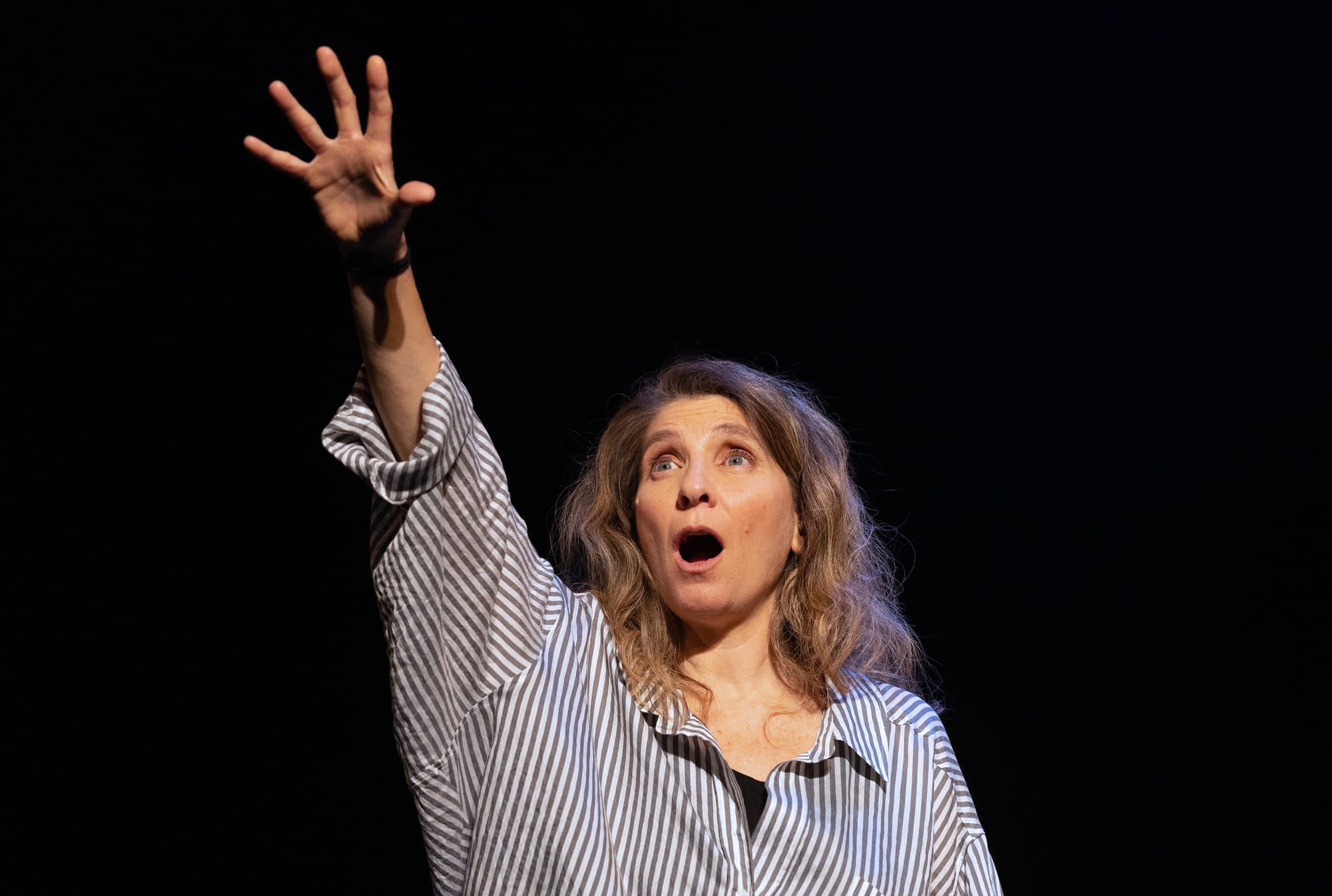
Other writing
Diane Flacks's semi-autobiographical one-person show, Guilt (A Love Story), is currently at the Tarragon until March 3. After that it plays the Centaur Theatre (March 12 to 30), the Great Canadian Theatre Company and the Manitoba Theatre Centre (April 3 to 20). See my review here.
Gregory Prest's De Profundis: Oscar Wilde in Jail, had a really short run at Soulpepper. I hope it comes back, or some other theatre picks it up. See my review here.
Earlier in the month, to coincide with Valentine's Day, I interviewed a bunch of people about their intense passion for theatre, which involved seeing some shows hundreds of times or buying up over a hundred tickets to distribute among friends, family and friends of friends. Here's my article on Theatre Super Fans.
At the beginning of the month, I interviewed Obsidian's artistic director Mumbi Tindyebwa Otu about telling Black stories onstage. Her production of UK-based writer Inua Ellams's Three Sisters, set in Nigeria before the Biafran Civil War, begins performances at Soulpepper next week. Here's my interview with her.
And finally, in anticipation of the return of the Broadway touring production of Aladdin, I got to talk with EGOT-winning composer Alan Menken. Here's my interview with him.
